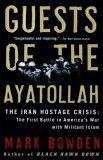Summary | Excerpt | Reviews | Beyond the Book | Readalikes | Genres & Themes | Author Bio

Critics' Opinion:
Readers' Opinion:
First Published:
Apr 2006, 704 pages
Paperback:
Mar 2007, 704 pages
 Book Reviewed by:
Book Reviewed by:
BookBrowse Review Team
Buy This Book
The capture of the U.S. embassy in Tehran was a glimpse of
something new and bewildering. It was the first battle in America’s war against
militant Islam, a conflict that would eventually engage much of the world.
Iran’s revolution wasn’t just a localized power struggle; it had tapped a
subterranean ocean of Islamist outrage. For half a century the traditionbound
peoples of the Middle and Near East, owning most of the world’s oil resources,
had been regarded as little more than valuable pawns in a worldwide competition
between capitalist democracy and communist dictatorship. In the Arab states, the
United States had thrown its weight behind conservative Sunni regimes, and in
Iran behind Pahlavi, who stood as a bulwark against Soviet expansionism in the
region. As the two great powers saw it, the Cold War would determine the shape
of the world; all other perspectives, those from the so-called Third World, were
irrelevant, or important only insofar as they influenced the primary struggle.
An ignored but growing vision in the Middle East, nurtured in mosque and
madrasah but considered quaint or backward by the Western world and even by many
wealthy, well-educated Arabs and Persians, saw little difference between the
great powers. Both were infidels, godless exploiters, uprooting centuries of
tradition and trampling sacred ground in heedless pursuit of wealth and power.
They were twin devils of modernity. The Islamist alternative they foresaw was an
old twist on a familiar twentieth-century theme: totalitarianism rooted in
divine revelation. It would take many years for the movement to be clearly seen,
but the takeover of the embassy in Tehran offered an early glimpse. It was the
first time America would hear itself called the “Great Satan.”
How and why did it happen? Who were the Iranian protesters
who swarmed over the embassy walls that day, and what were they trying to
accomplish? Who were the powers behind them, so heedless of age-old privileges
of international diplomacy? What were their motives? Why was the United States
so surprised by the event and so embarrassingly powerless to counter it? How
justified were the Iranian fears that motivated it? How did one of the triumphs
of Western freedom and technology, a truly global news media, become a tool to
further an Islamo-fascist agenda, narrowly focusing the attention of the world
on fifty-two helpless, captive diplomats, hijacking the policy agenda of America
for more than a year, helping to bring down the presidency of Jimmy Carter, and
leveraging a radical fundamentalist regime in Iran into lasting power?
The U.S. embassy in Tehran stood behind high brick walls
midway down the city’s muscular slope, where the land flattened into miles of
low brown slums and, beyond them, the horizon-wide Dasht-e Kavir salt desert.
Inside the enclosure was a parklike campus, a twenty-seven-acre oasis of green
in a smoggy world of concrete and brick. Its primary structure, the chancery,
bathed now in the swirling mist of the water angel, stood fifty or so feet
behind the front gate, a blocks-long structure two tall stories high built in
the dignified art deco style typical of American public buildings at midcentury.
It looked like a big American high school, which is why years ago it had been
dubbed “Henderson High,” after Loy W. Henderson, the first U.S. ambassador to
use it, in the early fifties. Scattered beneath a grove of pine trees behind the
chancery were the new concrete consulate buildings; the white Ambassador’s
Residence, a two-story structure with a wraparound second-story balcony; a
smaller residence for the deputy chief of mission; a warehouse; a large
commissary; a small office building and motor pool; and a row of four small
yellow staff cottages. There were tennis courts, a swimming pool, and a
satellite reception center.
Excerpted from Guests of the Ayatollah, (c) 2006 Mark Bowden. Reproduced by permission of Grove/Atlantic, Inc. All rights reserved.





The Funeral Cryer by Wenyan Lu
Debut novelist Wenyan Lu brings us this witty yet profound story about one woman's midlife reawakening in contemporary rural China.
Your guide toexceptional books
BookBrowse seeks out and recommends the best in contemporary fiction and nonfiction—books that not only engage and entertain but also deepen our understanding of ourselves and the world around us.